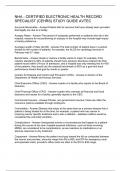Exam (elaborations)
NHA - CERTIFIED ELECTRONIC HEALTH RECORD SPECIALIST (CEHRS) STUDY GUIDE AVTEC
- Course
- Institution
Accounts Receivable - Answer-Patient bills for services that have already been provided that legally are due to a facility. Autopsy Rates - Answer-The percent of autopsies performed on patients who die in the hospital; reasons for not performing an autopsy in the hospital may include legal inqui...
[Show more]



